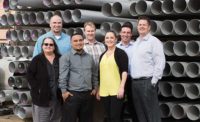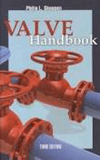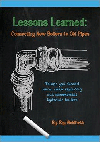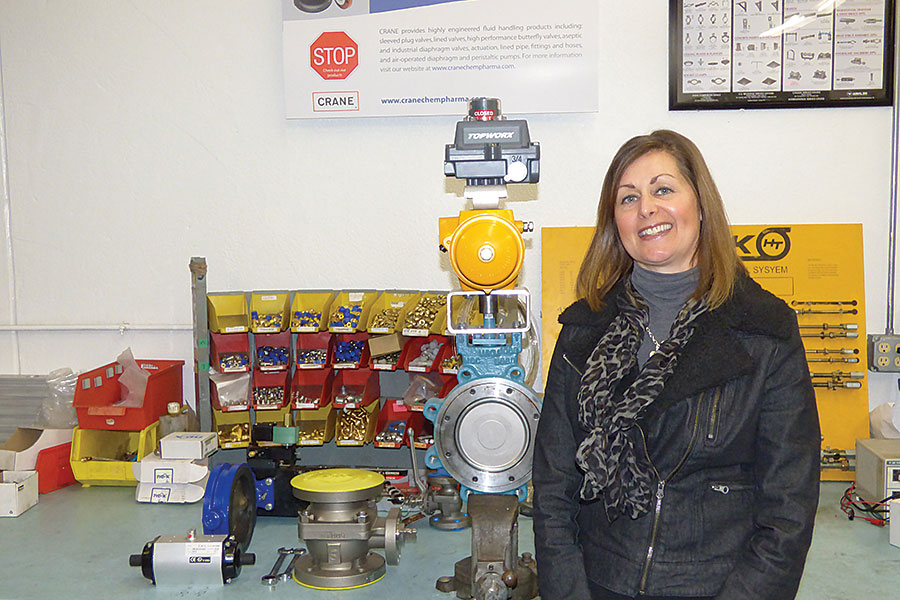Woman-owned American Precision Supply is an industrial PVF success story
APS primarily focuses on the chemical/petrochemical industries and also works with mechanical contractors on projects, OEMs and process piping plants.










Business at Hampshire, Ill.-based American Precision Supply has been brisk in recent times.
The 15-employee industrial pipe, valves and fittings distributor supplied material for the Silver Cross Hospital in the Chicago south suburb of New Lenox and is involved in the renovation of another well-known area hospital (Advocate Good Shepherd) in the northwest suburb of Barrington, while also finishing up work on a fertilizer plant.
But the recent project that takes the cake for APS is the materials it provided Ingersoll Rand that were used on a large solar telescope based in Hawaii.
“We do a little bit of everything here,” APS President Teri Sharp says at the company’s Hampshire location.
APS has come a long way in a short amount of time. Sharp helped start APS back in 2002 along with Sharp’s husband, Pat, and Eric Obrochta. Obrochta was a colleague of Pat Sharp’s from their days together at Joliet Valves/McJunkin Red Man. When Joliet Valves was sold to what now is MRC Global, the wheels started turning to the future for the Sharps and Obrochta.
“We decided we could fill a void in the market that was not being focused on by a larger PVF distribution company,” says Sharp, whose background prior to APS was in manufacturing customer service, HR, accounting and sales. “With my business and financial background and their sales expertise, we started the company. We put it all together and 12 years later here we are.”
Today, APS features two locations in Hampshire (located about 60 miles from Chicago where the company headquarters and actuation shop are located) and in the Chicago far south suburb of Coal City where eight acres houses a 25,000-sq.-ft. distribution center and pipe yard. APS primarily focuses on the chemical/petrochemical industries and also works with mechanical contractors on projects, OEMs and process piping plants. APS is one of the largest stocking distributors of XOMOX and Powell Valves products. APS recently added the new XOMOX FK product line.
Woman-owned company
Sharp, who has an MBA from Northern Illinois University, always has been involved with APS, but has taken on a more visible role the last five years and became company president in 2010. Pat Sharp and Obrochta, who have no ownership stake, still work for APS and each brings more than 30 years of sales experience to the table.
Recently, APS was given woman-owned certification status, something Sharp says was not easy to attain. “It’s difficult to get,” she says. “To be certified by a qualifying agency, a company must be 51% female owned and controlled. The control factor requires the operations of the business are handled on a daily basis by a female owner. It’s a stringent process and you have to certify yearly. They even send out site auditors to verify you are working here on a daily basis and are not simply someone who was put in that position as a figurehead.”
Sharp says having the certification (referred to as Women Business Enterprise certification through the National Women Business Owners Corporation) has spawned numerous benefits for APS. First, it allows APS to bid on jobs where larger corporations, such as public utilities, have percentages of work set aside for WBE companies, as well as veteran- and minority-owned firms. Sharp adds the certification acts as an additional marketing tool for the company — an avenue to further get its name and mission statement out to potential customers. APS, which also is trying to gain certification from the city of Chicago and Cook County, is in the midst of preparing a marketing campaign that highlights the WBE designation.
“These larger corporations have supplier diversity programs where there are certain spends and goal requirements,” she says. “For example, we’ve done some recent bidding for work at O’Hare Airport in Chicago. The certification allows us to participate in the bidding. It doesn’t guarantee we will get any business, but it’s a good marketing tool for the business.”
Being a woman owner in a male-dominated industry isn’t close to the most challenging part of the job, Sharp says. That honor, she notes, comes from heading a small business entrenched in an extremely competitive northern Illinois market.
“Any small-business owner has many day-to-day decisions to make as well as long-term planning for the growth of the business,” she says. “There always are challenges of inventory management, cash flow and making sure you have the best employees for the job requirements. It is imperative to stay focused in a very competitive industry. It’s very time-consuming and challenging being a woman small-business owner, but the wearing of many hats is very exciting and rewarding at the same time.”
2015 and beyond
In addition to many ongoing projects, APS has been plenty busy behind the scenes with its eye squarely on the future. A decision was made to consolidate inventory into the Coal City location with the actuation shop being moved to Hampshire.
“That will maximize efficiencies,” Sharp says. “We were constantly transferring product from the two places. Now we can run the trucks in a 200-mile radius out of the one location and get everybody in and out the same day.”
The Coal City building was upgraded with LED lighting, color-coded bins and the use of Brady labelers to mark customers’ product numbers. APS also hired two new salespeople and is ramping up its monthly lunch-and-learns with manufacturers it stocks.
“We feel manufacturer training is very beneficial for our people,” Sharp says. “It’s one or two hours. It helps the relationships we have with our manufacturers and it keeps our people up to speed with what is going on with particular customers.”
Sharp says customer-service enhancements are critical, especially given the company’s size and the competitive area where it conducts business.
“We offer the same types of products as larger companies do,” she says. “We use our knowledge and training to be more than just an order taker. We are solution providers. We have a smaller product line and we sell products that we represent to a good degree of doing them the proper justice. Our customers are comfortable with us. They know we are responsive and listen and give them different options and cost-effective solutions. We know very well they can go to other places in the area. We live and die by customer service. If we don’t do that, customers will call someone else and in most cases get a better price. It’s not like we’re selling Apple computer products that change. PVF has pretty much been PVF forever. The key is to keep providing solutions for your customers.”
APS also has benefitted from its relationship with the American Supply Association. Sharp is a member of the budding Women in Industry groupand plans on sending sales newcomers Jake Ghinazzi and Zach Dolph to the upcoming Young Executives DivisionSpring Forum in May. Additionally, the company utilizes ASA education tools through ASA University.
“ASA has been a big help to us,” she says. “When you are a small 15-emloyee company and you are trying to run everything, training can be hard. We rely on ASA for training. Our employees are great. They are like family to us. It’s important for us to have the most well-trained people possible so they can provide the best solutions for our customers. We want to make them successful and the best they can be. If you are a smaller company and can find a niche and have customers who you can find solutions for, they will continue to call on you.”
Sharp would like to see more women get involved in the industry, but adds the industry is in need of an influx of younger employees, regardless of gender.
“We need to do a better job of getting younger people interested and introduced in the industry,” she says. “It’s not a glamorous industry, but it has great selling points. If you look at a lot of the older and veteran people in the industry, they’ve been here a long time. That’s a key selling point. These people have done well and it’s a stable industry. I believe the PVF industry always will be viable and relevant. Here we feel there is growth in regional distribution — a niche market per se — by offering the best service and competent salespeople to provide custom solutions and add value with our automation facilities.”
Her advice to a young woman who might have the PHCP/PVF industry on her career path radar is simple. “Get as much product training as you can to be as knowledgeable as possible,” Sharp says. “With us, there are so many product offerings we represent and sell. We’re not the largest distributor, but we have a dedicated and talented sales staff that cares about customers. Women in this industry can be very successful if they are good listeners, have product knowledge and understand customers’ needs.”
Looking for a reprint of this article?
From high-res PDFs to custom plaques, order your copy today!















